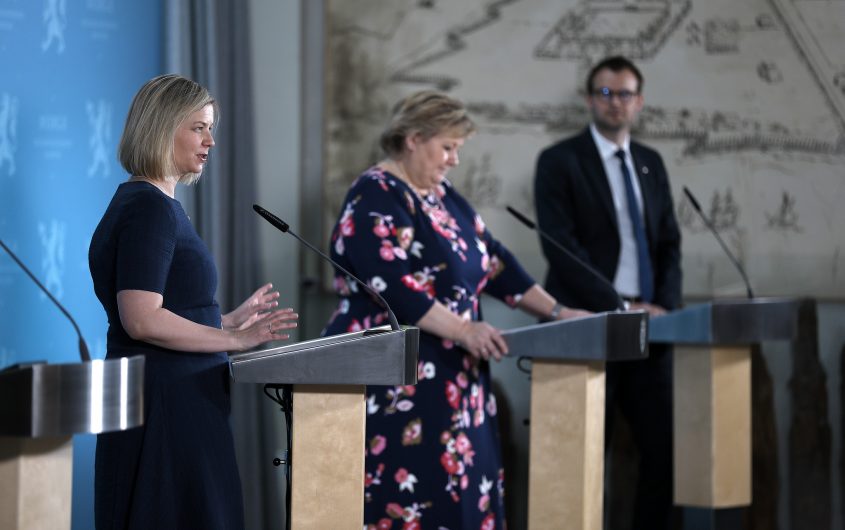
Statsministerens kontor via Flickr
Why Have Women World Leaders Performed So Well During the COVID-19 Crisis?

Louise K. Davidson-Schmich
University of Miami
Louise K. Davidson-Schmich is Professor of Political Science at the University of Miami. Davidson-Schmich came to UM in 2000 after receiving her PhD and MA in political science from Duke University and completing her undergraduate degree in international relations at Brown University. In 2016 she was a New Zealand Fulbright US Scholar at the Victoria University of Wellington.
Her research interests include gender and politics as well as politics in long-term democracies. She is the author of Gender Quotas and Democratic Participation: Recruiting Candidates for Elective Office in Germany (University of Michigan, 2016) as well as Becoming Party Politicians: Eastern German State Legislators in the Decade Following Unification (University of Notre Dame Press, 2006). Davidson-Schmich is also the editor of Gender, Intersections, and Institutions: Intersectional Groups Building Alliances and Gaining Voice in Germany (University of Michigan, 2017) and of a 2011 special issue of the journal German Politics entitled “Gender, Intersectionality, and the Executive Branch: The Case of Angela Merkel.” Davidson-Schmich is a member of the executive committee of the International Association for the Study of German Politics and serves on the editorial boards of Women, Politics and Policy, German Politics, German Politics and Society, and the German Studies Association’s Spektrum book series. She has published in journals including Party Politics, The Journal of Legislative Studies, and Democratization and been awarded funding from the Alexander von Humboldt Foundation, Fulbright, and the National Science Foundation’s Advance program (called SEEDS at the University of Miami).
In 2019, UN Women reported that a mere 5 percent of heads of government around the world were female.[1] These handful of women, including German chancellor Angela Merkel, have dominated 2020’s headlines when it comes to coverage praising national leaders’ handling of the current COVID-19 pandemic, however. Is this a coincidence or are women really better leaders than men?
The study of gender and politics offers some answers to this question. On the one hand, the positive press that Merkel and other women leaders are currently reaping may simply be due to the novelty of having a woman at the helm. On the other hand, there is clear evidence that some traits considered feminine are more suited to handling the current crisis than more masculine traits. Moreover, the underlying character of the countries with female heads of government enable these women to govern successfully during a health crisis.
There is clear evidence that some traits considered feminine are more suited to handling the current crisis than more masculine traits.
Male leaders face tough trade-offs governing during a time of pandemic. Psychologists have long shown that humans are socially punished for “gender role incongruity,” or displaying traits at odds with stereotypes of their gender. For example, while male leaders are praised if they display assertiveness—a typical masculine trait—assertive female politicians are often derided as bitchy and undesirable. Male politicians who exhibit feminized traits, such as a lack of toughness, are ridiculed for being “wimpy.” The current COVID-19 pandemic has created unprecedented health and economic challenges that bring with them a high degree of personal vulnerability, uncertainty, and emotional stress for everyone, including national leaders. The leaders who have been praised for their handling of the crisis are those who have admitted to their own personal and their citizens’ vulnerability to the virus, asked for expert scientific advice about dealing with an uncertain situation, and sought to empathize with the public’s myriad concerns. Chancellor Merkel was praised for her decision to self-isolate after being exposed to the virus by her doctor, Taiwanese president Tsai Ing-Wen was lauded for following the advice of medical professionals, and Norwegian prime minister Erna Solberg scored high marks for her reassuring press conference directed at children.
These women leaders may have felt confident in confessing vulnerability, asking for help, and sympathizing with others because these actions are all considered appropriate female behavior. Women, but not men, are socially rewarded when they perform these activities. In contrast, appearing invulnerable is a core tenant of masculinity; admitting they are susceptible to the virus is emasculating for men. Similarly, experimental studies show that male leaders who ask for help are perceived as being less competent than male leaders who don’t ask for assistance—or women who do. This helps explain why even in low-stakes, everyday life, men are reluctant to ask for directions. Rather than earning positive headlines for declaring the tooth fairy an essential worker, male leaders would run the risk of ridicule for discussing issues of interest to their youngest constituents. Social norms make it easier for female leaders than male leaders to deal with COVID-19 in an appropriate manner.
Another reason for the recent spate of headlines, however, may simply be the novelty of female leaders themselves. Many countries besides Merkel’s Germany, including Canada and South Korea, have received kudos for their handling of the pandemic but these states, like 90 percent of nations worldwide, are led by men. The ubiquity of male leadership worldwide renders Justin Trudeau and Moon Jae-in’s sex largely invisible to the public eye; reporters looking for a story are unlikely to seize upon these otherwise dissimilar leaders’ sex as an explanation for their actions. Contrast that to popular press comparisons between the female leaders of very different countries such as Iceland and Sint Maarten.
Bolsonaro, Trump, and Johnson’s embrace of what is often referred to as toxic masculinity clearly highlight the dangers certain types of masculine behavior pose to citizens.
The stark contrast between women leaders’ actions and those of a few, highly criticized, male heads of government may also be fueling the top marks women have earned. Brazilian president Jair Bolsonaro’s attendance at large rallies while coughing and denying the severity of the virus that has killed hundreds of thousands worldwide, U.S. president Donald Trump’s refusal to heed Center for Disease Control recommendations and wear a mask, and U.K. prime minister Boris Johnson’s boasting of shaking hands with coronavirus patients after being told not to by his own scientific advisory group, all sharply diverge from Merkel and other women leaders’ conduct. Bolsonaro, Trump, and Johnson’s embrace of what is often referred to as toxic masculinity clearly highlight the dangers certain types of masculine behavior pose to citizens.
Finally, many women leaders are well-poised to handle the current pandemic not only because of their own sex, but due to the nature of the states they lead. Female heads of government are rarely the sole woman in their country to have obtained a position of power and are often the tip of an iceberg of structures strengthening nations’ abilities to deal with a global pandemic. While women make up (slightly more than) half of the world’s population, today only 25 percent of legislators worldwide are women. In contrast, in the countries now led by women this figure rises to 36 percent—still not equal representation but much closer to parity. In half of these states, 40 percent or more of the legislative seats are filled by women. In such contexts, toxic masculinity is less likely to thrive than in places like Bosolaro’s Brazil (where 85 percent of legislators are men) or among Republicans in the U.S. Congress (91 percent male).
Where women have been well represented in the legislative branch, countries have developed more robust welfare states that are not only well equipped to provide healthcare for the sick, but also economic assistance to those who have lost their jobs and time off work for those who need to provide care.
When more women are represented in government, political science research finds significant differences in public policy, differences stemming from the pre-COVID-19 era that strengthen a state’s ability to respond to the current crisis. Around the world, where more women have entered into national legislatures, countries have spent more on healthcare; at the local level, too, female mayors have spent more on healthcare and social assistance than male mayors. Where women have been well represented in the legislative branch, countries have developed more robust welfare states that are not only well equipped to provide healthcare for the sick, but also economic assistance to those who have lost their jobs and time off work for those who need to provide care. Against this backdrop it is no wonder that female leaders such as Merkel have been well-situated to lead their countries through the COVID-19 pandemic. The world needs female leadership now more than ever.
[1] Countries with a female head of government as of May 8, 2020, include Bangladesh, Barbados, Belgium, Bolivia, Denmark, Finland, Germany, Iceland, Myanmar, Namibia, Norway, New Zealand, Serbia, Sint Maartin; several other countries are governed by a group that includes women: San Marino, Switzerland, and Sudan.








